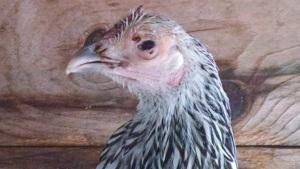
still swollen but open eye
Just a few days ago, I wrote about our little Silver Sebright, Isabelle and how she was dying.Isabelle had developed a solid growth on one eye (it looked like a large wart/tumor that was completely shutting her eye.) She went around for a while with the use of one eye and then her other eye started to swell shut.
What we ended up having was a blind chicken and no matter how much you love your birds, a blind chicken is not going to last long, especially during the winter months when she needs to be able to find her food and water while maneuvering around the coop. No one would have blamed me if I had put her down.
Even still, Isabelle did not seem to be in any pain, so I decided to give her a chance. Though she was completely blind, I decided to hold off and instead put her in isolation in an unused rabbit hutch. I placed food and water in a heavy ceramic dishes in the cage with her (she tipped over lighter dishes when she’d try to find them with her feet) and patiently showed her where they were located. I went out several times a day to make sure she was okay and each time I could tell that she could hear me but didn’t have a clue as to where I was. Normally a skittish bird, she sat quietly and a little scared while I stroked her feathers and talked quietly to her.
Quite frankly I didn’t have much hope for Isabelle. I gave her my version of chicken TLC – protection, water, and food (which included her favorite foods like fruit) and waited. I had my killing cone ready in the event that she started to show signs of distress. I love this little bird too much to let her suffer.
But Isabelle is a smart bird and she had other plans. Soon she figured out how to find her food and water. She nested inside a cardboard box that offered a little protection and warmth and she kept making it to the next day.
After a few days her less swollen eye surprisingly started to open up. She had plenty of bubbles in the eye and would shake her head with wetness (preventing her from rejoining the flock) but a half-blind bird is a bird that *might*, with assistance, make it through the winter. I became cautiously optimistic.
This morning when I went out to check on Isabelle, the “tumor” on her other eye had receded and that eye is also opening up. Like the other one it is wet and filled with bubbles, but now when I put my hand into her cage, she backs away from me.
Isabelle can see.
If I had to guess, I’d say that Isabelle had gotten some variant of fowl pox. She’s one of our older birds coming up on 6 years and, well, let’s just say the old gray mare just ain’t what she used to be. She was never in any kind of respiratory distress and her limbs were never affected (both signs of Mycoplasma gallisepticum – a particularly virulent infection that can wipe out a flock.) Pox is a tricky one, it’s one of those conditions that can run through a flock or it can stay to one bird. As our flock has been closed since the introduction of our 12 spring babies, it’s pretty clear that Isabelle got her infection from within our yard where our chickens free range. The virus/bacteria could have been dropped by a wild bird resting in one of our neighboring trees, she could have gotten it from scratching in the soil, or it could have been transmitted by mosquito. (Or it could be something altogether entirely different.) What I do know is that right now, no other birds seem to be affected.One bird with an illness is one bird with an illness – several birds in a flock with an illness is a big problem. Vigilance, my friends, vigilance is what’s called for (along with constant hand washing and observance of bio-security measures.)Although it looks like Isabelle may be out of the woods, I’m still keeping an eye on her. I’m just not sure at all of what she had and I don’t want my other chickens to “catch it” but if ever there was a bird who is a fighter and who didn’t want to let go, it’s our little Silver Sebright: Isabelle.
***
Wendy Thomas writes about the lessons learned while raising children and chickens in New Hampshire. Contact her at [email protected]
Also, join me on Facebook to find out more about the flock (children and chickens) and see some pretty funny chicken jokes, photos of tiny houses, and even a recipe or two.
Like what you read here? Consider subscribing to this blog so that you’ll never miss a post. And feel free to share with those who may need a little chicken love.

